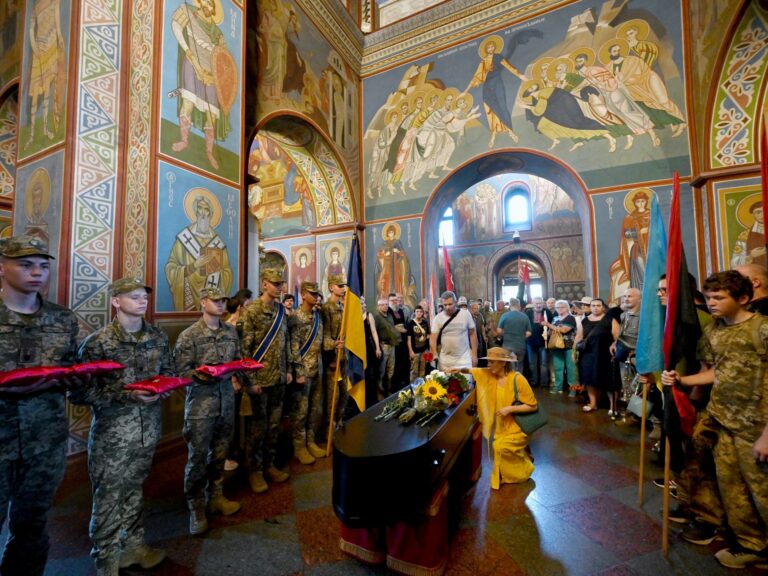As the war enters its 873rd day, here are the main developments.
This is where the war stands on Wednesday, July 17, 2024:
Struggle:
- Ukrainian drone attacks on Russia’s Kursk region have caused a fire at a factory producing electrical appliances and injured at least six people, local governors said. The Russian Defense Ministry said its forces destroyed 13 Ukrainian drones overnight, including one over the Kursk region on the border with Ukraine.
- Russian authorities have announced plans to restrict civilian access to 14 villages in the southern Belgorod region on the border with Ukraine due to continued shelling from Ukraine.
- Russian General Staff Chief Valery Gerasimov thanked Russian forces for capturing the village of Urozhaine in Ukraine’s eastern Donetsk region and “set new tasks for future activities,” according to the Russian Defense Ministry.
- Russian investigators said they are investigating the shooting of a wounded Russian soldier by Ukrainian forces in a video posted online by Ukraine’s Azov Brigade.
- Ukraine’s Defense Ministry has announced that it will provide its understaffed military with ammunition that was scrapped before the Russian invasion. The ammunition would undergo extensive quality checks before being distributed to Ukrainian forces on the front lines, it said.
Politics and diplomacy
- The Kremlin has reacted cautiously to Ukrainian President Volodymyr Zelensky’s invitation to a future peace summit, saying Moscow needs to understand what Kiev means before participating in the talks. The Ukrainian president had said Russia “should be” represented at a second summit on the war, after last month’s high-level talks in Switzerland in which Moscow did not participate.
- Former Russian President Dmitry Medvedev, a member of the country’s Security Council, said Ukraine’s membership in NATO would be a declaration of war against Moscow and that only “prudence” on the part of the alliance could prevent the planet from breaking into pieces.
- Hungarian Prime Minister Viktor Orban has sent a letter to European Union leaders, saying that Republican U.S. presidential candidate Donald Trump is ready to act “immediately“as a peace negotiator in the war between Russia and Ukraine if he is elected in November.
- European Council President Charles Michel responded to Orban’s letter by telling the Hungarian leader that he had No EU mandate for war negotiationsMichel also rejected Orban’s claim that the EU had pursued a “pro-war” policy in Ukraine.
- Estonia, Latvia and Lithuania have formally notified Russia and Belarus that they will withdraw from a 2001 agreement that linked the three Baltic states to a Moscow-controlled electricity grid, part of a move to sever ties with Russia after its invasion of Ukraine.
- At the United Nations, Russian Foreign Minister Sergei Lavrov accused the United States of demanding “blind obedience” from its allies and threatening multilateralism.
- The Russian Orthodox Church in Kazakhstan has dismissed a priest who opposed Moscow’s invasion of Ukraine. Hieromonk Lakov had advocated the creation of a breakaway Orthodox Church, free from Moscow’s influence.
- Japan is finalizing arrangements to lend Ukraine $3.3 billion using interest from frozen Russian assets, about 6 percent of the G7’s total of $50 billion, Kyodo news agency reported, citing diplomatic sources.
Economy
- Ukraine’s parliament has voted to remove taxes and duties on imports of energy equipment – including wind and solar power – as the country faces a severe energy crisis due to Russian bombing.
- Ukrainian state-owned company Ukroboronservice and Czech ammunition manufacturer Sellier et Bellot have signed an agreement to build an ammunition plant in Ukraine, the two countries announced.
- Kaspersky, the Russia-based global cybersecurity company, has announced it will shut down its operations in the United States after Washington sanctioned its top officials and banned the sale of its popular antivirus software.
- Russia’s communications regulator has demanded that Google restore more than 200 Russian YouTube channels that the US company had blocked for broadcasting pro-Kremlin content, including on the conflict in Ukraine.


